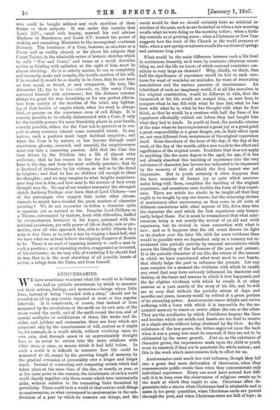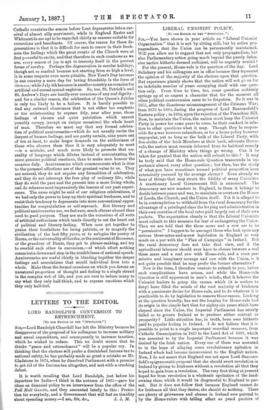ANNIVERSARIES.
WE have sometimes wondered what life would be to beings who had no periodic recurrences by which to measure out their actions, feelings, and memories,—beings whose little lives, instead of being "rounded with a sleep," should not be rounded at all by any events repeated at more or less regular intervals. It is conceivable, of course, that instead of lives measured by the revolutions of the earth on its own axis, of the moon round the earth, and of the earth round the sun, and of special multiples or subdivisions of these, like weeks and de- cades, and jubilees and centenaries, there are lives which are measured only by the consciousness of will, exerted as it might be, for example, in a world which, without revolving upon its own axis, shot through space in an approximately straight line, so as never to return into the same relations with other stars, or suns, or moons which it had held before. In such a world it is difficult to conceive how life could be measured at all, except by the growing length of memory, by the gradual extension of personality over a longer and longer track. Instead of connecting and comparing events which had taken place at the same time of the day, or month, or year, or at the same point in the century, the inhabitants of such a world could classify together only those events which were intrinsically alike, without relation to the connecting links furnished by periodicity. There could be in a world of that sort no such things as anniversaries, or what correspond to anniversaries in the sub- divisions of a year by which we measure our doings, and the
result would be that we should certainly have no artificial re- minders of the past, such as are furnished us when a new morning recalls what we were doing on the morning before ; when a birth- day reminds us of growing years ; when a Christmas or New Year suggests how the work of the Church or the world prospers or fails ; when a new spring or autumn recalls the emotions of springs and autumns long past.
What would be the main difference between such a life lived in continuous linearity, as it were, by creatures otherwise resem- bling us, and the life we know, of which seasonal reminders con- stitute so very large an element ? Why, chiefly, we think, that half the significance of experience would be lost to such crea- tures for want of reminder on reminder, for want of renovating associations and the various passions of reminiscence. An inhabitant of such an imaginary world, if at all like ourselves in his original constitution, would be different in this, that the framework of his life would not compel him, as ours does, to compare what he has felt with what he does feel, what he has been with what he is, what he has thought with what he does think, so that he would be a creature with half the lines of his experience effectually rubbed out before they had taught him . what they had to teach. In youth at least, the periodic returns of the time when we have experienced a great joy or a great grief, a great responsibility or a great danger, are, in their effect upon us, not very different from recurrences of the original experience itself. Even the return of the hour of the day, of the day of the week, of the day of the month, adds a new touch to the effect and significance of the original event. Doubtless that does not apply in anything like the same degree to the aged, for age, if it has not already absorbed this teaching of experience into the very substance of character, has become too indurated to be impressed by the memory of that of which the first impact was not impressive. But in youth certainly it often happens that the keen reminder of former joy or pain which anniver- saries bring with them, completes the teaching of the original experience, and sometimes even doubles the force of that experi- ence. There are minds too elastic to be taught all that they ought to be taught by any one lesson; but the returning strokes of anniversary after anniversary, as they come in all sorts of different connections with other aspects of life, drive deep into the character the seed which the first experience only tempo- rarily lodged there. For it must be remembered that what anni- versaries bring is not merely the revival of an old and vivid experience, but its revival in close connection with what is new ; and so it happens that the old event throws its light or its shadow over the later life with far more vividness than would be possible were we dependent only on a memory not re- awakened into periodic activity by seasonal associations which secure the blending of the influences of the past and present. It is the periodic character of our life, the return of the seasons in which we have experienced what went most to our hearts, that chiefly helps the past to influence the present. Let any man compare for a moment the vividness with which he recalls any event that may have seriously influenced his character and destiny, at the times and seasons in which it first happened, and the far slighter vividness with which he recalls it at other seasons as a part merely of the story of his life, and he will see at once that without the periodic return of days and months and years, memory would be robbed of a great portion of its educating power. Anniversaries renew delight and revive suffering with a force with which it is impossible for the un- assisted memory to renew or revive either the one or the other. They are the auxiliaries by which Providence deepens the lines and touches which our minds and hearts are too frail to receive at a single stroke without being shattered by the blow. As the substance of the tree grows, the letters engraved upon the bark when it was a young tree mast be renewed, if they are not to be obliterated by the newer growth. Just so, as the substance of character grows, the impressions made upon the child or youth must be renewed, if they are to penetrate the whole nature ; and this is the work which anniversaries help to effect for us.
Anniversaries exert much less real influence, though they fall into a great deal more elaboration of observance, when they commemorate public events than when they commemorate only individual experience. Every one must have noticed how diffi- cult it is to keep even the observances of religious events up to the mark at which they ought to aim. Christmas often de- generates into a season when Christmas-beef is attainable and is eaten in too great quantities, when Christmas-cards are poured. through the post, and when Christmas-trees are full of toys ; in
Catholic countries the season before Lent degenerates into a car- nival of almost silly merriment; while in England Easter and Whitsuntide are apt to be regarded chiefly as seasons suitable for excursions and beanfeasts. Of course, the reason for these de- generations is that it is difficult for men to renew in their fresh- ness the feelings which the great events of the Church were at first powerful to excite, and that therefore in such creatures as we are, every season of joy is apt to travesty itself in the poorest forms of revelry. Perhaps the degeneration in secular holidays, though not so marked because not starting from so high a level, is in some respects even more pitiable. New Year's Day becomes in one country a mere day for taxing friendship in the form of elrennes; while July 4th becomes in another country an occasion for artificial and unreal spread-eagleism. So, too, St. Patrick's and St. Andrew's Days are hardly ever occasions of any real dignity ; and for a similar reason, the celebration of the Queen's Jubilee is only too likely to be a failure. It is hardly possible to find any outward observance that is not either too emphatic or too uninteresting to express fitly, year after year, those feelings of sincere and quiet patriotism which cannot possibly occupy (except on unique occasions) the whole heart of man. Therefore we must say that any formal celebra- tion of political anniversaries—which do not usually excite the deepest of human feelings, and are pretty certain, nine years out of ten at least, to make larger demands on the enthusiasm of those who observe them than it is easy adequately to meet —is a mistake, and much more likely to promote that un- reality of language which dilutes instead of concentrating the more genuine political emotions, than to make men honour the occasion duly. Anniversaries which commemorate what is dear to the personal affections are of the greatest value to us. They are natural, they do not require any formalities of celebration, and they do not interrupt the free play of ordinary life ; while they do weld the past and the present into a more living whole, and do rehearse most impressively the lessons of our past experi- ences. The same might be said of our religious celebrations, if we had only the power to keep up their spiritual freshness, and to resist their tendency to degenerate into mere conventional oppor- tunities for congratulation or self-reproach. But literary and political anniversaries are, we feel sure, much oftener abused than used to good purpose. They are made the occasions of all sorts of artificial enthusiasm which tends directly to eat the heart out of political and literary feeling. When men get together to praise their forefathers for being patriots, or to magnify the civilisation of the last fifty years, or to eulogise the poetry of Burns, or the universality of Goethe, or the sentiment of Rousseau, or the grandeur of Dante, they get to phrase-making, and try to overbid each other in encomium,—of which effort nothing comes but a downward step in the truthfulness of national speech. Anniversaries are useful chiefly in blending together the deeper feelings and associations that mould individual lives into a whole. Make them the formal occasions on which you devote an unnatural proportion of thought and feeling to a single strand in the complex web of life, and you are sure to induce many to say what they only half-think, and to express emotions which they only half-feel.















































 Previous page
Previous page